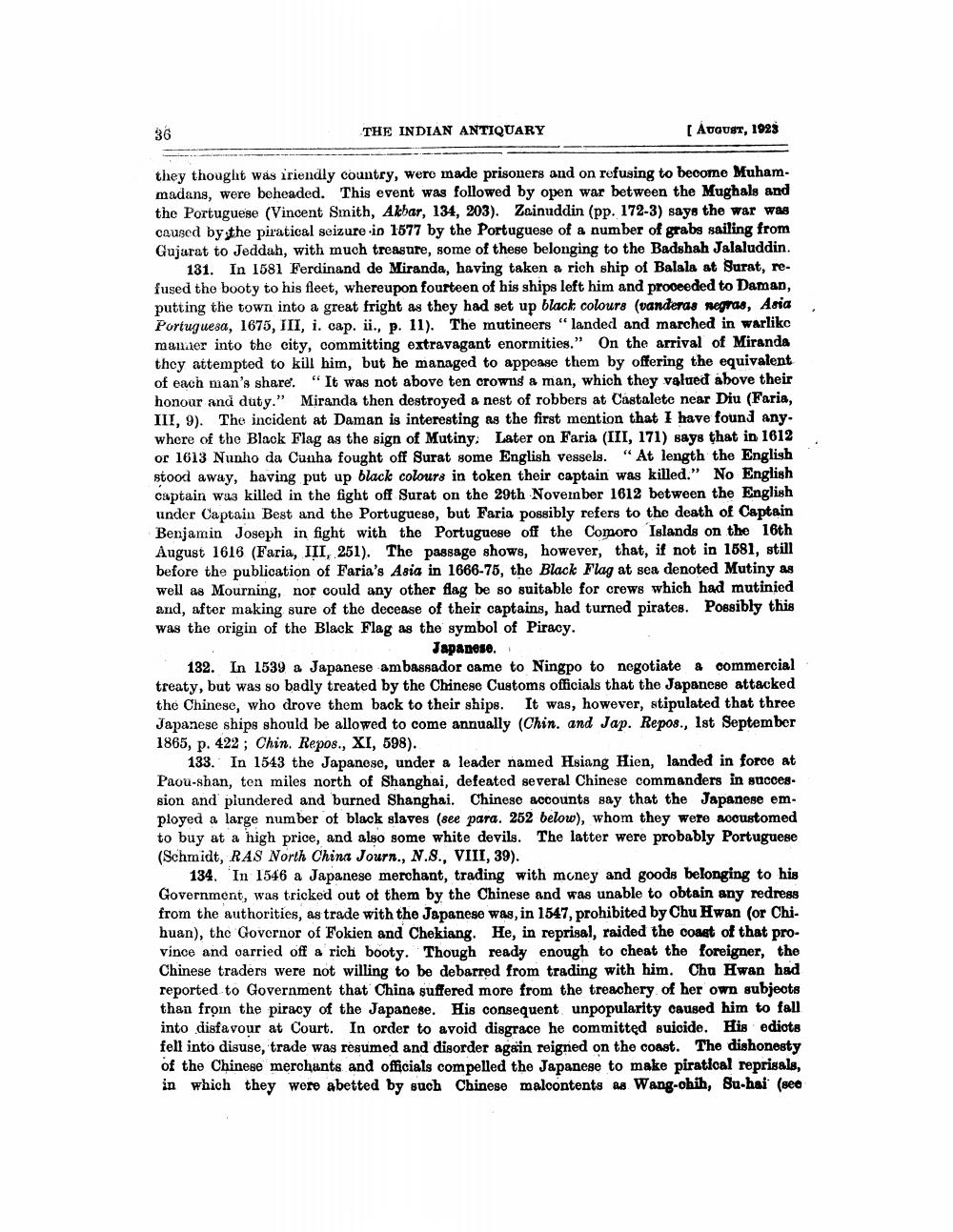________________
THE INDIAN ANTIQUARY
[ August, 1923
they thought was iriendly country, were made prisoners and on refusing to become Muhammadans, were beheaded. This event was followed by open war between the Mughals and the Portuguese (Vincent Smith, Akbar, 134, 203). Zainuddin (pp. 172-3) says the war was caused by the piratical seizure.in 1577 by the Portuguese of a number of grabs sailing from Gujarat to Jeddah, with much treasure, some of these belonging to the Badshah Jalaluddin.
131. In 1581 Ferdinand de Miranda, having taken a rich ship of Balala at Surat, refused the booty to his fleet, whereupon fourteen of his ships left him and proceeded to Daman, putting the town into a great fright as they had set up black colours (vanderas negras, Asia Portuguesa, 1675, III, i. cap. ii., p. 11). The mutineers "landed and marched in warliko mamer into the city, committing extravagant enormities." On the arrival of Miranda they attempted to kill him, but he managed to appoase them by offering the equivalent of each man's share. "It was not above ten crowns a man, which they valued above their honour and duty." Miranda then destroyed a nest of robbers at Castalete near Diu (Faria, III, 9). The incident at Daman is interesting as the first mention that I have found any. where of the Black Flag as the sign of Mutiny: Later on Faria (III, 171) says that in 1612 or 1613 Nunho da Cunha fought off Surat some English vessels. "At length the English stood away, having put up black colours in token their captain was killed." No English captain was killed in the fight off Surat on the 29th November 1612 between the English under Captain Best and the Portuguese, but Faria possibly refers to the death of Captain Benjamin Joseph in fight with the Portuguese off the Comoro Islands on the 16th August 1616 (Faria, III, 251). The passage shows, however, that, if not in 1581, still before the publication of Faria's Asia in 1666-75, the Black Flag at sea denoted Mutiny as well as Mourning, nor could any other flag be so suitable for crews which had mutinied and, after making sure of the decease of their captains, had turned pirates. Possibly this was the origin of the Black Flag as the symbol of Piracy.
Japanese. 132. In 1539 a Japanese ambassador came to Ningpo to negotiate a commercial treaty, but was so badly treated by the Chinese Customs officials that the Japanese attacked the Chinese, who drove them back to their ships. It was, however, stipulated that three Japanese ships should be allowed to come annually (Chin. and Jap. Repos., 1st September 1865, p. 422 ; Chin. Repos., XI, 598).
133. In 1543 the Japanese, under a leader named Hsiang Hien, landed in force at Paou-shan, ten miles north of Shanghai, defeated several Chinese commanders in succes. sion and plundered and burned Shanghai. Chinese accounts say that the Japanese employed a large number of black slaves (see para. 252 below), whom they were acoustomed to buy at a high price, and also some white devils. The latter were probably Portuguese (Schmidt, RAS North Chint Journ., N.S., VIII, 39).
134. In 1546 a Japanese merchant, trading with money and goods belonging to his Government, was tricked out of them by the Chinese and was unable to obtain any redress from the authorities, as trade with the Japanese was, in 1547, prohibited by Chu Hwan (or Chi. huan), the Governor of Fokien and Chekiang. He, in reprisal, raided the coast of that province and carried off a rich booty. Though ready enough to cheat the foreigner, the Chinese traders were not willing to be debarred from trading with him. Chu Hwan had reported to Government that China suffered more from the treachery of her own subjeots than from the piracy of the Japanese. His consequent unpopularity caused him to fall into disfavour at Court. In order to avoid disgrace he committed suicide. His ediots fell into disuse, trade was resumed and disorder again reigned on the coast. The dishonesty of the Chinese merchants and officials compelled the Japanese to make piratioal reprisals, in which they were abetted by such Chinese malcontents as Wang-ohih, Su-hai (seo




